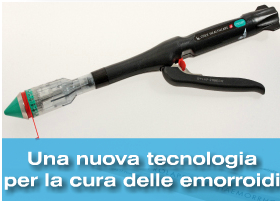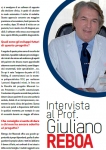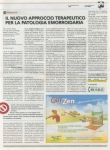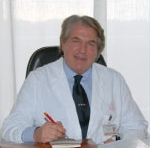 Prof. Giuliano Reboa is surgeon c/o la Casa di Cura San Camillo di Forte dei Marmi since 2/1/2012 and he
has been Director of the specialist “Complex Operative Unit” for the treatment of colorectal-anal pathologies of the General
Surgery Department at San Martino University Hospital since 2001 to 31/12/2011. He has been Deputy Head of the Department of Surgery since 2005 to 2011 and,
since 2007 to 2011, National Vice-President of the United Italian Society of Colon-Proctologic Surgery (Società Unitaria di Chirurgia Colon-Proctologica: SIUCP).
To date, he is the author of 276 scientific publications in the sector of Colon-Proctology and of six books
Prof. Giuliano Reboa is surgeon c/o la Casa di Cura San Camillo di Forte dei Marmi since 2/1/2012 and he
has been Director of the specialist “Complex Operative Unit” for the treatment of colorectal-anal pathologies of the General
Surgery Department at San Martino University Hospital since 2001 to 31/12/2011. He has been Deputy Head of the Department of Surgery since 2005 to 2011 and,
since 2007 to 2011, National Vice-President of the United Italian Society of Colon-Proctologic Surgery (Società Unitaria di Chirurgia Colon-Proctologica: SIUCP).
To date, he is the author of 276 scientific publications in the sector of Colon-Proctology and of six books
next
1st International Congress on the "Multidisciplinary Managment of Pelvic Floor Diseases" Pisa, 17 Novembre 2016
In tale occasione il Prof. Giuliano Reboa modera una importante Tavola Rotonda dal titolo "High Volume Prolassectomy. State of the art and next steps"
Incontro Regionale Acoi. Rivoli, 11 Novembre 2016
Il Prof. Giuliano Reboa tiene una Conferenza sulle innovazioni nella Chirurgia del Prolasso Emorroidario
Terzo Incontro Nazionale Amici della Proctologia. Modena, 16-17 Giugno 2016
In tale occasione il Prof. Giuliano Reboa modera una importante Tavola Rotonda sulle "Innovazioni in Chirurgia Proctologica"
Missione a Riga (Lettonia) dal 13-16 Aprile 2016
Su invito dell'Università di Riga e di un gruppo di Cliniche Private, il Prof Giuliano Reboa tiene una serie di Conferenze sulla Chirurgia del Prolasso Emorroidario ed esegue inoltre 5 interventi chirurgici presso l'Università di Riga, in collegamento diretto col mondo accademico locale. La missione ottiene complessivamente un grande successo.
Convegno "Digestive Surgery: Training Managment and Innovative Tecnology in Surgery" Roma, 7-9 Aprile 2016
In tale Convegno il Prof. Giuliano Reboa ha comunicato i Risultati di un importante Studio Policentrico, da lui coordinato, sulla Chirurgia ad Alto Volume del Prolasso Emorroidario, in cui si dimostra l'abbattimento delle recidive sotto il 2% dei casi trattati
Un anno di Maserati loves prevention
Il Giornale interno di Maserati pubblica questo importante articolo sul progetto "Maserati loves prevention" che consiste in un intervento di prevenzione primaria su tutti i dipendenti dell'azienda modenese. Questa operazione di "Welfare aziendale avanzato" viene gestita da "G.G. Holding s.r.l.", società presieduta dal Prof. Giuliano Reboa, La Società, leader nel settore del Welfare Aziendale, si avvale della collaborazione di circa una trentina di medici particolarmente preparati sulla prevenzione ed operanti su tutto il territorio nazionale.
Vai alla rassegna Stampa
In tale occasione il Prof. Giuliano Reboa modera una importante Tavola Rotonda dal titolo "High Volume Prolassectomy. State of the art and next steps"
Incontro Regionale Acoi. Rivoli, 11 Novembre 2016
Il Prof. Giuliano Reboa tiene una Conferenza sulle innovazioni nella Chirurgia del Prolasso Emorroidario
Terzo Incontro Nazionale Amici della Proctologia. Modena, 16-17 Giugno 2016
In tale occasione il Prof. Giuliano Reboa modera una importante Tavola Rotonda sulle "Innovazioni in Chirurgia Proctologica"
Missione a Riga (Lettonia) dal 13-16 Aprile 2016
Su invito dell'Università di Riga e di un gruppo di Cliniche Private, il Prof Giuliano Reboa tiene una serie di Conferenze sulla Chirurgia del Prolasso Emorroidario ed esegue inoltre 5 interventi chirurgici presso l'Università di Riga, in collegamento diretto col mondo accademico locale. La missione ottiene complessivamente un grande successo.
Convegno "Digestive Surgery: Training Managment and Innovative Tecnology in Surgery" Roma, 7-9 Aprile 2016
In tale Convegno il Prof. Giuliano Reboa ha comunicato i Risultati di un importante Studio Policentrico, da lui coordinato, sulla Chirurgia ad Alto Volume del Prolasso Emorroidario, in cui si dimostra l'abbattimento delle recidive sotto il 2% dei casi trattati
Un anno di Maserati loves prevention
Il Giornale interno di Maserati pubblica questo importante articolo sul progetto "Maserati loves prevention" che consiste in un intervento di prevenzione primaria su tutti i dipendenti dell'azienda modenese. Questa operazione di "Welfare aziendale avanzato" viene gestita da "G.G. Holding s.r.l.", società presieduta dal Prof. Giuliano Reboa, La Società, leader nel settore del Welfare Aziendale, si avvale della collaborazione di circa una trentina di medici particolarmente preparati sulla prevenzione ed operanti su tutto il territorio nazionale.
Vai alla rassegna Stampa
Link

|
Conferenza "Integrated treatment with Stapler Haemorroidopexy an Proctonorm of patients with Haemorroidal Disease"
In data 17 dicembre 2019 il Prof. Reboa ha tenuto la conferenza presso l'Hotel Sheraton di Milano |

|
Digestive Surgery. Future Challenges and new tecnologies. Roma 12-14 Aprile 2018 Il Prof. Reboa ha partecipato in qualità di "Expert" ad una importante sessione sul Prolasso Rettale, con particolare riferimento alla Chirurgia ad Alto Volume |

|
St. Mark's meets Imperia. Giornata di Studio sulla Chirurgia del Prolasso Rettale e della Fistola Anale. 23 Marzo 2018 In tale occasione il Prof. Reboa ha moderato una importantissima Tavola Rotonda in cui, sul tema del Prolasso Rettale, si è confrontata l'esperienza degli esperti del prestigioso St. Marks Hospital di Londra con la Scuola Italiana.Le linee guida emerse dal confronto costituiranno un importante riferimento per la Comunità Scientifica Internazionale. |

|
International Joint Meeting on Colo-rectal and Pelvic Floor Surgery. 10th Siucp National Congress. Napoli, 8-10 Giugno 2017 In tale occasione il Prof. Reboa presenta una nuova suturatrice, da lui ideata, la CPH36SMS, che consente di eseguire l'intervento di Starr, utilizzando una sola suturatrice invece di due. Tale innovazione semplifica enormemente la tecnica e consente migliori risultati nella cura della Ostruita Defecazione. |
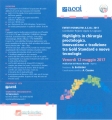
|
Convegno Acoi Piemonte. 12 Maggio 2017
In tale occasione il Prof. Reboa tiene una Relazione sui vantaggi della Tecnologia ad Alto Volume sul trattamento del prolasso, delle Emorroidi e sulla sindrome da Ostruita Defecazione. Le suturatrici ad alto volume, studiate e realizzate dal Prof. Reboa, sono oggi adottate in tutto il mondo. |
Prof. Giuliano Reboa
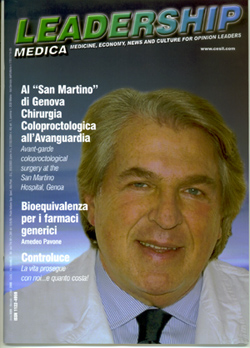 Diseases of the colon, rectum and anus represent a serious problem from the economic and social standpoints. Indeed, hemorrhoids, anal fissures, fistulae and constipation affect up to 80% of the adult population of Italy. The consumption of pharmaceutical drugs and the working days lost because of these disorders generate very high costs. The specialist strives to solve these problems through the constant updating of diagnostic and therapeutic techniques and through the application of technological and scientific advances. Over the last few years, important technological innovations have been introduced. These have enabled increasingly advanced and conservative surgical operations to be carried out, with the result that pain and postoperative complications have been considerably reduced. In order to use these technologies, the traditional General Surgeon must become a super-specialist, a trend which is in line with what is happening in many branches of medicine. Indeed, ongoing scientific and technological advances have led to a progressive sectorial specialization of the General Surgeon; today, in addition to the traditional specialties, most large national healthcare institutions are equipped with
Diseases of the colon, rectum and anus represent a serious problem from the economic and social standpoints. Indeed, hemorrhoids, anal fissures, fistulae and constipation affect up to 80% of the adult population of Italy. The consumption of pharmaceutical drugs and the working days lost because of these disorders generate very high costs. The specialist strives to solve these problems through the constant updating of diagnostic and therapeutic techniques and through the application of technological and scientific advances. Over the last few years, important technological innovations have been introduced. These have enabled increasingly advanced and conservative surgical operations to be carried out, with the result that pain and postoperative complications have been considerably reduced. In order to use these technologies, the traditional General Surgeon must become a super-specialist, a trend which is in line with what is happening in many branches of medicine. Indeed, ongoing scientific and technological advances have led to a progressive sectorial specialization of the General Surgeon; today, in addition to the traditional specialties, most large national healthcare institutions are equipped with 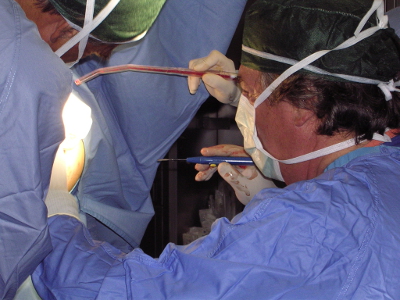 General Surgery facilities oriented toward specialist areas: essentially, these areas are Urgency/Emergency Surgery, Endocrine and Breast Surgery, Hepatobiliary and Pancreatic Surgery and Surgery of the Colon, Rectum and Anus. Modern Colorectal Surgery is the result of a professional commitment that involves an educational background which cannot be restricted to rectal and anal pathology, as in the case of the traditional "Proctologist"; rather, the surgeon’s experience must necessarily extend to the large intestine and abdominal organs. Surgery of this kind can properly be carried out only by a surgeon who has gained adequate experience in general surgery and has subsequently undergone specific training in colorectal surgery. The result is a veritable ultra-specialization in every respect, as recently revealed by an investigation conducted by the American Board of Colon and Rectal Surgery which compared the expertise of trainees in colorectal surgery with that of their colleagues in general surgery. In over 500,000 surgical procedures examined in the early 2000s, it emerged that, while still in the phase of academic training, the trainees performed a far higher number of colorectal operations than the general surgeons. The greater volume of activity in specific areas of surgery is accompanied not only by better results in terms of a reduction in postoperative complications and mortality but also, as has been well demonstrated with regard to colorectal cancers, by a reduction in tumor recurrences and a substantial improvement in survival. Just for this reason the surgeon constitutes an independent variable in the process of treating the patient. In line with the developments mentioned above, our first aim was to transform a department previously oriented exclusively toward the proctologic sector into an Operative Unit which, while continuing to handle purely proctologic pathologies such as hemorrhoids, anal fissures and fistulae in a day-hospital setting, would also provide integrated treatment for more complex problems, such as inflammatory and neoplastic diseases of the large intestine. For example, in the proctologic sphere, therapeutic options have been broadened and diversified; in the case of hemorrhoids, these options range from combined treatment (elasto-cryotherapy) carried out in an ambulatory setting for grade II hemorrhoids, to traditional hemorrhoidectomy according to Milligan-Morgan, and to the removal of hemorrhoids by means of new technological methods of vascular synthesis; in addition, mucoprolapsectomy according to Longo is routinely performed. With regard to obstructed defecation syndrome, in highly selected patients we propose "Stapled Trans-Anal Rectal Resection"(STARR) , which provides an effective solution to a clinical problem of great social importance. Moreover, several innovative approaches have been developed by our team; in cases of sacrococcygeal fistulae (sinus pilonidalis) , for instance, we usually adopt a particular technique of plastic reconstruction combined with a method taken from regenerative medicine, which involves applying a platelet gel with autologous fibrin glue; this procedure shortens postoperative recovery times and yields definitive healing in over 95% of cases. For what concerns more complex colorectal diseases, especially cancers, these necessitate, first of all, the organization of a multidisciplinary team able not only to provide exhaustive answers to diagnostic and therapeutic questions but also to handle the specific needs that may arise during the follow-up of these patients: integrated treatments, specialist support for the creation of temporary or definitive abdominal stomas and, not least, psychological support for patients and their families. Technology certainly plays a considerable role in this setting, too, and the availability of highly sophisticated means of vascular and tissue synthesis and mechanical and computerized suturing devices enables international operating standards to be reached. Moreover, for the past couple of years, we have been using a sophisticated technology for Transanal Endoscopic Microsurgery (TEM) which enables us to treat tumors of the lower rectum at an initial stage and/or patients at high anaesthesiologic risk without having to perform laparotomy or create an abdominal stoma. All of these factors have undoubtedly contributed to increasing our volume of activity and to drawing in patients from outside our geographic area. In addition, there is a need to interact with other national and international referral centers; indeed, our operative unit has now been part of the Italian network of Colon-proctologic Operative Units of the SIUCP for several years, and has become a Center of High Specialization in the colon-proctologic sector. Confirmation of this can be seen in the fact that just this year we have set up an "Advanced Permanent Specialist Training Course in Colon-proctologic Surgery" ; the first theoretical and practical live-surgery course focused on the treatment of hemorrhoids and obstructed defecation syndrome, and was attended by trainees from all over the country. Furthermore, we have maintained constant cultural and scientific exchanges with prestigious international referral centers, such as the University of Tubingen in Germany, St Elizabeth Hospital in Vienna and St Mark’s Hospital in London, in order to ensure that our activity profile conforms to international standards. Finally, with regard to short/medium-term objectives, a top priority is to set up a permanent training center in colon-proctology that will be institutionally recognized thanks to the on-site availability of multimedia teaching facilities that will enable advanced live-surgery courses to be held. From the clinical standpoint, we are trying to promote and implement all of those technologically advanced modalities of "painless" treatment of colon-proctologic pathologies, and to finally render operational a center for the rehabilitation and treatment of incontinence and assistance for stoma patients.
General Surgery facilities oriented toward specialist areas: essentially, these areas are Urgency/Emergency Surgery, Endocrine and Breast Surgery, Hepatobiliary and Pancreatic Surgery and Surgery of the Colon, Rectum and Anus. Modern Colorectal Surgery is the result of a professional commitment that involves an educational background which cannot be restricted to rectal and anal pathology, as in the case of the traditional "Proctologist"; rather, the surgeon’s experience must necessarily extend to the large intestine and abdominal organs. Surgery of this kind can properly be carried out only by a surgeon who has gained adequate experience in general surgery and has subsequently undergone specific training in colorectal surgery. The result is a veritable ultra-specialization in every respect, as recently revealed by an investigation conducted by the American Board of Colon and Rectal Surgery which compared the expertise of trainees in colorectal surgery with that of their colleagues in general surgery. In over 500,000 surgical procedures examined in the early 2000s, it emerged that, while still in the phase of academic training, the trainees performed a far higher number of colorectal operations than the general surgeons. The greater volume of activity in specific areas of surgery is accompanied not only by better results in terms of a reduction in postoperative complications and mortality but also, as has been well demonstrated with regard to colorectal cancers, by a reduction in tumor recurrences and a substantial improvement in survival. Just for this reason the surgeon constitutes an independent variable in the process of treating the patient. In line with the developments mentioned above, our first aim was to transform a department previously oriented exclusively toward the proctologic sector into an Operative Unit which, while continuing to handle purely proctologic pathologies such as hemorrhoids, anal fissures and fistulae in a day-hospital setting, would also provide integrated treatment for more complex problems, such as inflammatory and neoplastic diseases of the large intestine. For example, in the proctologic sphere, therapeutic options have been broadened and diversified; in the case of hemorrhoids, these options range from combined treatment (elasto-cryotherapy) carried out in an ambulatory setting for grade II hemorrhoids, to traditional hemorrhoidectomy according to Milligan-Morgan, and to the removal of hemorrhoids by means of new technological methods of vascular synthesis; in addition, mucoprolapsectomy according to Longo is routinely performed. With regard to obstructed defecation syndrome, in highly selected patients we propose "Stapled Trans-Anal Rectal Resection"(STARR) , which provides an effective solution to a clinical problem of great social importance. Moreover, several innovative approaches have been developed by our team; in cases of sacrococcygeal fistulae (sinus pilonidalis) , for instance, we usually adopt a particular technique of plastic reconstruction combined with a method taken from regenerative medicine, which involves applying a platelet gel with autologous fibrin glue; this procedure shortens postoperative recovery times and yields definitive healing in over 95% of cases. For what concerns more complex colorectal diseases, especially cancers, these necessitate, first of all, the organization of a multidisciplinary team able not only to provide exhaustive answers to diagnostic and therapeutic questions but also to handle the specific needs that may arise during the follow-up of these patients: integrated treatments, specialist support for the creation of temporary or definitive abdominal stomas and, not least, psychological support for patients and their families. Technology certainly plays a considerable role in this setting, too, and the availability of highly sophisticated means of vascular and tissue synthesis and mechanical and computerized suturing devices enables international operating standards to be reached. Moreover, for the past couple of years, we have been using a sophisticated technology for Transanal Endoscopic Microsurgery (TEM) which enables us to treat tumors of the lower rectum at an initial stage and/or patients at high anaesthesiologic risk without having to perform laparotomy or create an abdominal stoma. All of these factors have undoubtedly contributed to increasing our volume of activity and to drawing in patients from outside our geographic area. In addition, there is a need to interact with other national and international referral centers; indeed, our operative unit has now been part of the Italian network of Colon-proctologic Operative Units of the SIUCP for several years, and has become a Center of High Specialization in the colon-proctologic sector. Confirmation of this can be seen in the fact that just this year we have set up an "Advanced Permanent Specialist Training Course in Colon-proctologic Surgery" ; the first theoretical and practical live-surgery course focused on the treatment of hemorrhoids and obstructed defecation syndrome, and was attended by trainees from all over the country. Furthermore, we have maintained constant cultural and scientific exchanges with prestigious international referral centers, such as the University of Tubingen in Germany, St Elizabeth Hospital in Vienna and St Mark’s Hospital in London, in order to ensure that our activity profile conforms to international standards. Finally, with regard to short/medium-term objectives, a top priority is to set up a permanent training center in colon-proctology that will be institutionally recognized thanks to the on-site availability of multimedia teaching facilities that will enable advanced live-surgery courses to be held. From the clinical standpoint, we are trying to promote and implement all of those technologically advanced modalities of "painless" treatment of colon-proctologic pathologies, and to finally render operational a center for the rehabilitation and treatment of incontinence and assistance for stoma patients. 

